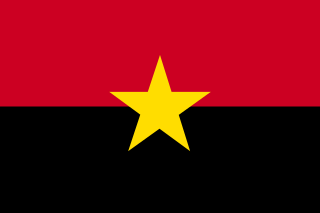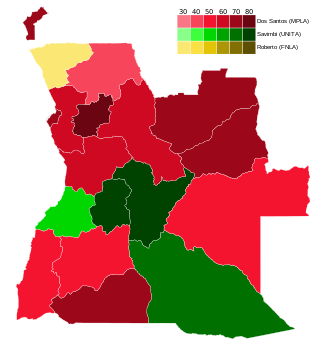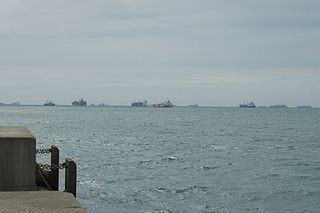Related Research Articles

Angola was first settled by San hunter-gatherer societies before the northern domains came under the rule of Bantu states such as Kongo and Ndongo. In the 15th century, Portuguese colonists began trading, and a settlement was established at Luanda during the 16th century. Portugal annexed territories in the region which were ruled as a colony from 1655, and Angola was incorporated as an overseas province of Portugal in 1951. After the Angolan War of Independence, which ended in 1974 with an army mutiny and leftist coup in Lisbon, Angola achieved independence in 1975 through the Alvor Agreement. After independence, Angola entered a long period of civil war that lasted until 2002.

The National Union for the Total Independence of Angola is the second-largest political party in Angola. Founded in 1966, UNITA fought alongside the Popular Movement for the Liberation of Angola (MPLA) in the Angolan War for Independence (1961–1975) and then against the MPLA in the ensuing civil war (1975–2002). The war was one of the most prominent Cold War proxy wars, with UNITA receiving military aid initially from the People's Republic of China from 1966 until October 1975 and later from the United States and apartheid South Africa while the MPLA received support from the Soviet Union and its allies, especially Cuba.

The People's Movement for the Liberation of Angola, for some years called the People's Movement for the Liberation of Angola – Labour Party, is an Angolan social democratic political party. The MPLA fought against the Portuguese Army in the Angolan War of Independence from 1961 to 1974, and defeated the National Union for the Total Independence of Angola (UNITA) and the National Liberation Front of Angola (FNLA) in the Angolan Civil War. The party has ruled Angola since the country's independence from Portugal in 1975, being the de facto government throughout the civil war and continuing to rule afterwards.

The Angolan Civil War was a civil war in Angola, beginning in 1975 and continuing, with interludes, until 2002. The war began immediately after Angola became independent from Portugal in November 1975. It was a power struggle between two former anti-colonial guerrilla movements, the communist People's Movement for the Liberation of Angola (MPLA) and the anti-communist National Union for the Total Independence of Angola (UNITA).

The United Nations Angola Verification Mission II, established May 1991 and lasting until February 1995, was the second United Nations peacekeeping mission, of a total of four, deployed to Angola during the course of the Angolan Civil War, the longest war in modern African history. Specifically, the mission was established to oversee and maintain the multilateral ceasefire of 1990 and the subsequent Bicesse Accords in 1991, which instituted an electoral process for the first time including the two rival factions of the civil war, the People's Movement for the Liberation of Angola (MPLA), the de facto government of Angola, with control of Luanda and most of the country since independence in 1975, and the National Union for the Total Independence of Angola (UNITA).
The Bicesse Accords, also known as the Estoril Accords, laid out a transition to multi-party democracy in Angola under the supervision of the United Nations' UNAVEM II mission. President José Eduardo dos Santos of the MPLA and Jonas Savimbi of UNITA signed the accord in Lisbon, Portugal on May 31, 1991. UNITA rejected the official results of the 1992 presidential election as rigged and renewed their guerrilla war.
The Mitterrand–Pasqua affair, also known informally as Angolagate, was an international political scandal over the secret sale and shipment of arms from Central Europe to the government of Angola by the Government of France in the 1990s. The scandal has been tied to several prominent figures in French politics.

General elections were held in Angola on 29 and 30 September 1992 to elect a President and National Assembly, the first time free and multi-party elections had been held in the country. They followed the signing of the Bicesse Accord on 31 May 1991 in an attempt to end the 17-year-long civil war. Voter turnout was 91.3% for the parliamentary election and 91.2% for the presidential election.
The Alvor Agreement, signed on 15 January 1975 in Alvor, Portugal, granted Angola independence from Portugal on 11 November and formally ended the 13-year-long Angolan War of Independence.
The Agreement among the People's Republic of Angola, the Republic of Cuba, and the Republic of South Africa granted independence to Namibia from South Africa and ended the direct involvement of foreign troops in the Angolan Civil War. The accords were signed on 22 December 1988 at the United Nations Headquarters in New York City by the Foreign Ministers of People's Republic of Angola, Republic of Cuba and Republic of South Africa.
The 2000s in Angola saw the end of a 27-year-long civil war (1975–2002) and economic growth as foreign nations began to invest in Angola's untapped petroleum reserves. The government continues to resettle internally displaced persons as its economy recovers and expands.

Relations between Angola and Zimbabwe have remained cordial since the birth of the states in 1975 and 1980, respectively, during the Cold War. While Angola's foreign policy shifted to a pro-U.S. stance based on substantial economic ties, under the rule of President Robert Mugabe Zimbabwe's ties with the West soured in the late 1990s.
The 1970s in Angola, a time of political and military turbulence, saw the end of Angola's War of Independence (1961–1975) and the outbreak of civil war (1975–2002). Agostinho Neto, the leader of the People's Movement for the Liberation of Angola (MPLA), declared the independence of the People's Republic of Angola on November 11, 1975, in accordance with the Alvor Accords. UNITA and the FNLA also declared Angolan independence as the Social Democratic Republic of Angola based in Huambo and the Democratic Republic of Angola based in Ambriz. FLEC, armed and backed by the French government, declared the independence of the Republic of Cabinda from Paris. The National Liberation Front of Angola (FNLA) and the National Union for the Total Independence of Angola (UNITA) forged an alliance on November 23, proclaiming their own coalition government based in Huambo with Holden Roberto and Jonas Savimbi as co-presidents and José Ndelé and Johnny Pinnock Eduardo as co-Prime Ministers.
In the 1980s in Angola, fighting spread outward from the southeast, where most of the fighting had taken place in the 1970s, as the African National Congress (ANC) and SWAPO increased their activity. The South African government responded by sending troops back into Angola, intervening in the war from 1981 to 1987, prompting the Soviet Union to deliver massive amounts of military aid from 1981 to 1986. The USSR gave the Angolan government over US$2 billion in aid in 1984. In 1981, newly elected United States President Ronald Reagan's U.S. assistant secretary of state for African affairs, Chester Crocker, developed a linkage policy, tying Namibian independence to Cuban withdrawal and peace in Angola.

Relations between Angola and South Africa in the post-apartheid era are quite strong as the ruling parties in both states, the African National Congress in South Africa and the MPLA in Angola, fought together during the Angolan Civil War and South African Border War. They fought against UNITA rebels, based in Angola, and the apartheid-era government in South Africa which supported them. Nelson Mandela mediated between the MPLA and UNITA during the final years of the Angolan Civil War. Although South Africa was preponderant in terms of relative capabilities during the late twentieth century, the recent growth of Angola has led to a more balanced relation.
The Brazzaville Protocol mandated the withdrawal of Cuban troops from Angola, paving the way for Namibia's independence through the New York Accords. Representatives from the governments of Angola, Cuba, and South Africa signed the protocol on December 13, 1988 in Brazzaville, Congo.
In the 1990s in Angola, the last decade of the Angolan Civil War (1975–2002), the Angolan government transitioned from a nominally communist state to a nominally democratic one, a move made possible by political changes abroad and military victories at home. Namibia's declaration of independence, internationally recognized on April 1, eliminated the southwestern front of combat as South African forces withdrew to the east. The MPLA abolished the one-party system in June and rejected Marxist-Leninism at the MPLA's third Congress in December, formally changing the party's name from the MPLA-PT to the MPLA. The National Assembly passed law 12/91 in May 1991, coinciding with the withdrawal of the last Cuban troops, defining Angola as a "democratic state based on the rule of law" with a multi-party system.
The Halloween Massacre was an armed conflict between supporters of UNITA and the MPLA that took place from October 30 to November 1, 1992, in Luanda, Angola. The conflict occurred as a result of UNITA breaking the Bicesse Accords, on account of alleged voter fraud in the 1992 Angolan general elections, resulting in a number of armed MPLA supporters and police around Luanda harassing and murdering a significant number of opposition party supporters. Thousands of UNITA supporters are estimated to have been murdered.

United Nations Security Council resolution 976, adopted unanimously on 8 February 1995, after reaffirming resolutions 696 (1991) and all subsequent resolutions on Angola, the Council authorised the establishment of a new peacekeeping mission in the country, the United Nations Angola Verification Mission III with an initial mandate ending on 8 August 1995.

United Nations Security Council resolution 1135, adopted unanimously on 29 October 1997, after reaffirming Resolution 696 (1991) and all subsequent resolutions on Angola, the Council extended the mandate of the United Nations Observer Mission in Angola (MONUA) until 30 January 1998 and urged UNITA to comply with previous resolutions, particularly as sanctions were due to come into effect.
References
- 1 2 3 4 5 6 7 8 9 10 Vines, Alex. Angola Unravels: The Rise and Fall of the Lusaka Peace Process, 1999. Human Rights Watch.
- ↑ New York Times November 1, November 16, November 21 1994
- 1 2 3 4 Rothchild, Donald S. Managing Ethnic Conflict in Africa: Pressures and Incentives for Cooperation, 1997. pp. 137–138.